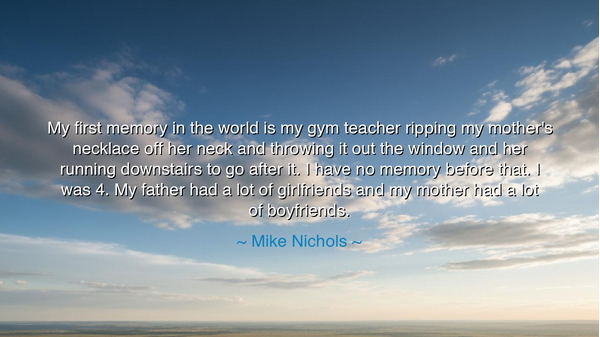
My first memory in the world is my gym teacher ripping my
My first memory in the world is my gym teacher ripping my mother's necklace off her neck and throwing it out the window and her running downstairs to go after it. I have no memory before that. I was 4. My father had a lot of girlfriends and my mother had a lot of boyfriends.






Hear now the words of Mike Nichols, whose remembrance is heavy with the weight of childhood: “My first memory in the world is my gym teacher ripping my mother’s necklace off her neck and throwing it out the window, and her running downstairs to go after it. I have no memory before that. I was four. My father had many girlfriends and my mother had many boyfriends.” This confession is not merely a tale of personal sorrow, but a window into the shaping of the human spirit. For from our earliest memories, we carry stones that build the walls of our identity.
In this vision, the necklace is more than ornament. It is a symbol of love, of dignity, of the fragile treasures we cling to in a world of chaos. To see it ripped away is to witness the violence of life itself: the shattering of innocence, the first taste of betrayal, the cruel unveiling of a world not always gentle. The mother’s chase after it mirrors the eternal struggle of humanity—to run after what has been lost, to descend into hardship in the hope of recovering even a fragment of beauty.
So often, the first memory is not joy, but pain. It carves itself into the child’s heart because pain has the power to awaken. Nichols, in his small frame of four years, became aware that life is not stable, that bonds may fracture, that even the family—his father wandering, his mother divided—can be a place of unrest. Yet from such beginnings, the soul learns resilience. Out of shattered glass, many build the mosaics of their destiny.
Consider the tale of Victor Hugo, whose childhood was torn between a stern father and a passionate mother, each pulling his spirit in opposite directions. Out of this conflict came a mind capable of seeing both the cruelty and the majesty of life. It is as though the soul, bruised early, develops eyes sharp enough to perceive both shadow and light. Nichols too, though marked by turmoil, would later weave stories on the stage and screen that revealed the depths of human contradiction. From suffering came vision.
This truth is ancient: that the child who endures brokenness may, if they endure, become the adult who perceives life with rare clarity. Yet it is not automatic. Some remain trapped in the wounds of their beginnings. The wise, however, learn to shape pain into art, confusion into understanding, memory into power. The necklace ripped away can become the seed of insight. The silence before the first memory can become the space where imagination grows.
The lesson, then, is this: do not despise your first memory, even if it is bitter. For it is the foundation stone of who you are. Rather than curse it, learn to read it. Ask yourself: what did it teach me? What did it reveal? What strength did it force me to cultivate? Every early wound can become a teacher, every early fracture a hidden well of compassion for others who suffer as you did.
In your life, when you meet a child, remember: you may be shaping the first memory they will carry into eternity. A harsh word may mark them for decades; a kind act may save their spirit. Choose carefully the imprint you leave. And for yourself, practice turning your own memories into wisdom, rather than chains. When you revisit the necklace of your past, do not only grieve its loss—seek to understand why you still chase after it, and what it has taught you about the meaning of life.
Thus, O listener, take this saying to heart: though your beginnings may have been tangled with sorrow, they need not define your ending. Out of the fragments of childhood, you may build a vision, a voice, a legacy. For as Nichols shows us, even the most painful first memory can become the spark of a life that teaches others. Hold your past, not as a curse, but as a sacred text. Learn from it, and let it shape you into one who creates meaning where once there was only loss.






AAdministratorAdministrator
Welcome, honored guests. Please leave a comment, we will respond soon